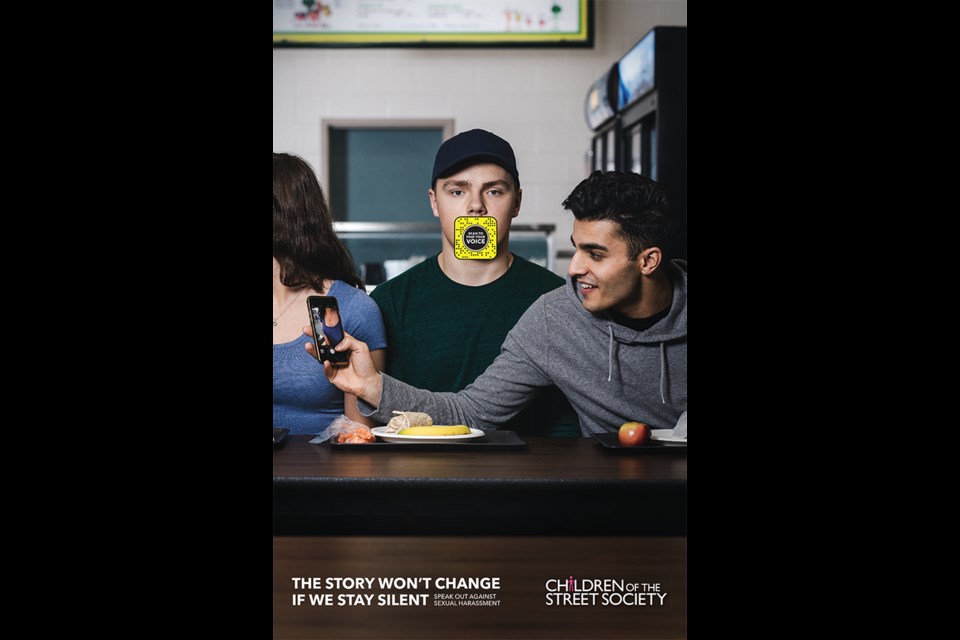When it comes to creating a culture of respect between the genders, the best place to start is with the youth, says the Children of the Street Society.
During B.C.'s Stop the Sexual Exploitation of Children and Youth Awareness Week this week, the Coquitlam-based youth advocacy organization is launching a campaign to get young people to talk about the highly charged issue of sexual harassment.
Provocative posters depicting a teen boy taking pictures of an unsuspecting girl’s chest with his phone or snapping a bra strap — and layered with a scan code kids can use to connect to the popular smartphone app Snapchat — are being placed in bus shelters around the Lower Mainland.
Teens can connect to the app to say how bystanders should respond in the image, and can share the images with their friends.
Television ads will also be aired to get across the point that harassment or "locker room talk" that may once have been accepted is no longer appropriate in the workplace, social gatherings or other places where men and women or boys and girls are together.
In light of the recent social media #MeToo movement, the issue is timely, and using an app popular with teens might get them thinking about their behaviour.
“Snapchat can be one of the apps that can be used to exploit others, so try to use it in a positive way is what were thinking,” said Maura Fitzpatrick, the society’s fundraising manger.
March is the month when Children of the Street steps up its awareness campaigns around sexual exploitation of youth and, with the help of communications company Cossette, chose to focus on the source of the problem: a culture where inappropriate sexual advances appear to have been accepted in many areas of public life, from politics to the movies.
“I think generally it’s a discussion about being respectful to people regardless of gender or sexual orientation, and I think kids are more open to discussing that. And maybe adults think that’s not really an issue in the workplace but there are lots of women who can recall over the course of their career where it has become an issue,” Fitzpatrick said.
If ending workplace harassment and sexual assault is the goal, then the work of changing the culture begins with educating boys.
Recent studies have shown boys as young as 12 years of age are accessing online pornography, “and it’s not your dad or granddad’s Playboy magazine under the bed,” said Fitzpatrick, noting that violence is common, with 90% of internet pornography containing at least one scene depicting violence against women.
Popular culture, in which the male is hyper masculine, particularly in rap, and females play smaller, more compliant roles, reinforces stereotypes that need to be challenged, Fitzpatrick said, or at least young people should be asked to give more thought to what’s going on in these art forms.
To that end, Children of the Street has started a new workshop, called Redefining Manhood, geared to youths in Grade 9 to 12, that looks into these issues.
“Whether you’re a boy or a young man, I think the discussion needs to be had,” Fitzpatrick said.
• Show you are against sexual exploitation of youth by purchasing a pink daisy pin. They are available this month at local Canadian Tire, Vancity and Rona locations. For more information, visit www.childrenofthestreet.com



